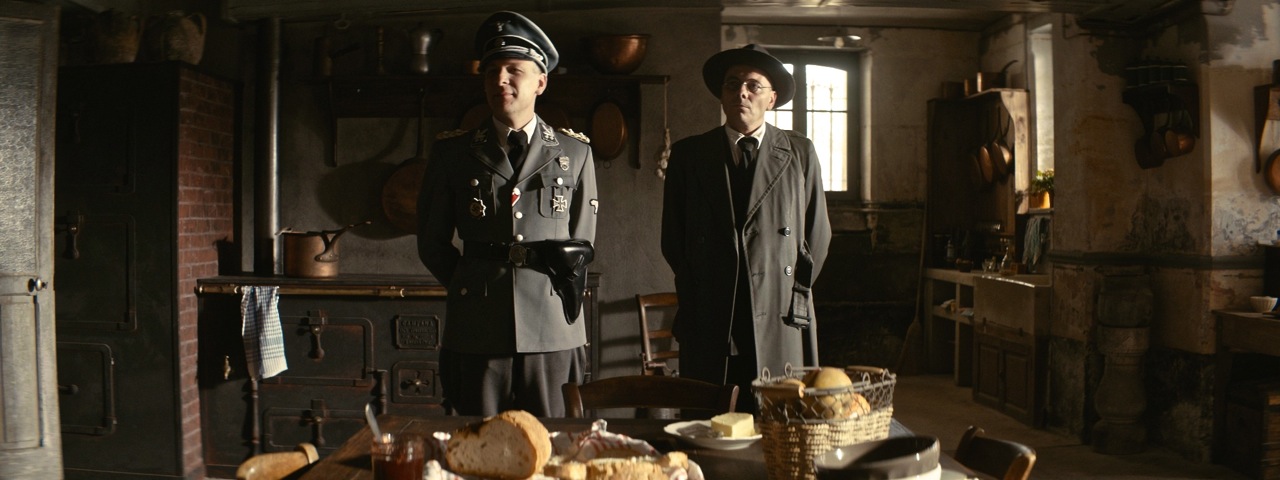By Chlotrudis Independent Film Society
Rating: 2.5 cats
Director: Jonathan Helpert
Starring: David Atrakchi | Esther Comar | Jochen Hägele | Julie Judd | LauraBoujenah | Maxime Dambrin

Country: france
Year: 2016
Running time: 86
IMDB: http://www.imdb.com/title/tt3772660/
Jason says: “Ambiguity is a powerful tool for filmmakers and other storytellers if they can handle the challenges of using the same material to build two opposing narratives at once, and not just because pulling it off is an impressive achievement. It engages audiences’ intellects as well as their emotions, gives them something to talk about afterward, and makes things feel more sophisticated than masterfully crafted clarity. The thing to watch out for – and what makes HOUSE OF TIME take a hard fall – is that pursuing ambiguity can lead to paralysis, an unwillingness to do anything that might mark one path as true, making that lack of a definitive answer the entire point rather than a reason to think more about a particular subject.
“It doesn’t quite present itself as a puzzle from the beginning, but it comes close, quickly introducing the idea that Robert d’Eglantine (Maxime Dambrin) has invited five friends plus associate Elsa Orsic (Julie Judd) to an out-of-the-way country house on 18 May 2014 that he claims was near the site of secret SS experiments during the war that created a sort of wake that would take them back in time 70 years that night. Thinking it just a peculiar party game, the guests dress in period clothing and, sure enough, their mobile phones stop working at the appointed hour. That can be explained, especially since Robert has the resources not only for a hidden signal jammer but the other obstacles that keep them from exploring the world outside. But what of Mathilde Barthélémy (Esther Comar), an injured Resistance operative who shows up soon enough. She readily admits to having been an actress, but would she take a bullet for this sort of role?
“Taken on its own, the idea that the five guests (Elsa is there to be a medic of sorts) may either have been transported back to the Second World War or be part of an elaborate and potentially sadistic bit of role-play seems like it could be entertaining and even have a philosophical bent, but for some reason, director Jonathan Helpert and writer Jean Helpert are only willing or able to push things so far. That the question is open due to the lack of knowledge rather than conflicting information isn’t a cheat, but it’s the less exciting way to make a movie out of the situation. It necessitates the mystery being the source of the movie’s tension rather than potentially being surrounded by Nazis or the likelihood that a friend is playing a cruel joke.
“That could work, except that nobody seems to care enough. These characters aren’t nouvelle vague intellectuals who will intellectually ponder their circumstances, they aren’t curious enough to try very hard to discover the truth empirically, and they aren’t people of action who will act on what they believe their situation to be (rightly or wrongly). They play along with Robert claiming they must not do anything to reveal themselves as time travelers before their apparently-automatic return to 2014 lest they create a paradox, but that just means that nothing interesting happens for long stretches of the film for what seem like extremely arbitrary reasons, including Robert just digging the lot of them to prevent exploration (and little in the way of complaint despite it not being the sort of drugs that make a party more fun), and what’s the point of a mystery if it doesn’t inspire people to actually do something?
“The film is also a bit overstuffed with characters so that the Helperts can have some soap-opera material to go with their time travel, which leaves everybody doing less than they could. The heck of it is, despite the characters seldom having more than the one or two traits Robert lists when introducing them, they’re a pretty decent ensemble. Maxime Dambrin does not have as large a part as one might expect for playing the guy who organizes the whole thing, but he sells Robert’s mad eccentricity and has some very entertaining wild takes when things seem to be going of the rails later on. Esther Comar is a very bright spot as Mathilde; she’s got to be convincing enough to make the others at least consider the possibility that they are in 1944, but she plays Mathilde just modern enough that she could be contemporary. Jochen Hägele is a late-entering MVP as either the Nazi looking to conquer time or the actor playing same. And while almost none of the individual guests prove themselves essential enough to the story that the roster couldn’t be trimmed a bit, Laura Boujenah steps up as Catherine, the most skeptical and the one with a story of how her Jewish grandmother miraculously escaped on this day.
“The rest of the cast does all right, especially when the script gives them some weird, mordant French humor to play. It’s a nicely-mounted production as well, using how it is limited to a fairly tight area to its advantage by making sure everything there looks and sounds good, making a virtue of not overreaching. For all that I found myself frustrated by its passivity later on, the filmmakers tend to make it work in the moment, stringing together good moments with hints that bigger ones are just around the corner.
“That sort of moment-to-moment competence and the ambiguous situation that it works so hard to sustain create a bit of an illusion that HOUSE OF TIME is better and more sophisticated than it is, but unless the lack of resolution is considered a virtue on its own, it is something of an empty exercise, neither asking terribly interesting questions nor seeking the answers with particular vigor. 2.5 cats”
“Seen 6 February 2016 in Somerville Theatre #2 (Boston Sci-fi Film Festival, digital)”
